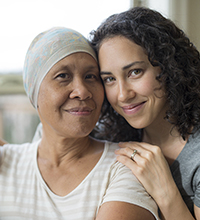Stories from patients at Banner MD Anderson
Lodging is of particular concern for those who travel great distances to receive care, especially when longterm treatment is required
These patients and their supportive care givers must stay near the Banner MD Anderson Cancer Center for lengthy periods of time—often at great personal expense. To help ease this burden for patients and families, the Home Away From Home campaign will help build the Patient Housing Assistance Endowment, a permanent fund established by the Banner Health Foundation.
Because of the level of expertise in our Hematology Oncology area, blood and immune cancer patients now represent the second-largest volume of patients at Banner MD Anderson, next to the breast cancer population. For these patients, stem-cell transplantation and clinical trial participation are common, both requiring close proximity to the Cancer Center for periods of two weeks to up to six months. Leukemia patients require immediate, lengthy hospitalization upon diagnosis, requiring family members to quickly find local lodging.
Across all types of cancer, patients receiving daily radiation therapy, those recovering from surgery, and participants in clinical trials require nearby lodging to accommodate their frequent visits.
| GIVE TO HOME AWAY FROM HOME |
Patient Navigators and Social Workers who work diligently to connect patients with resources are finding there simply aren’t enough resources available. In addition, they are discovering unsettling stories about patients sleeping in cars, in dangerous or unsanitary areas of town, or, in the case of stem-cell transplant patients, well outside of the safe distance required post-transplant. And some patients forego treatment altogether due to lack of housing.
Here are some of their stories.

|
Aleshanee is a Native American breast cancer patient from Rock Point, Arizona
Aleshanee recently needed a multiple-night stay during the planning phase for her treatment. She had to keep appointments for back-to-back days as physicians staged her cancer and developed her protocol. The Fourth of July weekend was approaching and hotel rooms were hard to come by. Those that were available had undergone significant rate increases. Unable to locate a room she could afford, Aleshanee delayed the start of her treatment, creating anxiety during an already difficult time. Patient Navigators and Social Workers finally found a place for Aleshanee, but it was a week-and-a-half later than the originally scheduled start of her treatment.
Judy received a breast cancer diagnosis during spring training season
Judy needed lodging at the worst possible time to find a hotel room in the Valley. It was Major League Baseball’s spring training season and “snowbirds” were still in town enjoying the beautiful weather. All affordable rooms were booked and hotels had significantly raised their rates. All Judy needed was three or four nights, yet the cost of her stay would amount to thousands of dollars at these inflated rates. Like Aleshanee, Judy could not afford the cost of lodging during peak season.

|
James, a stem-cell transplant patient, was skipping treatments
When Patient Navigators learned that James was living in his car at times and had started to forego some of his treatments, they worked the phones trying to cobble together assistance from any and every local and national program possible to try to ensure he could continue his treatment with a bed to sleep in. His situation remains tenuous.
Allen from Overgaard, Arizona, was blindsided by a leukemia diagnosis
Before Allen was diagnosed with cancer in October, he held down a full-time job and provided for himself. Money was tight, but he was doing just fine. Single and active, he did not see it coming when he was blindsided by the acute myeloid leukemia diagnosis he received after visiting the emergency room for feeling poorly. His mother, a widow who lives in Prescott Valley, accompanied him to Banner MD Anderson Cancer Center. Since he was a newly diagnosed leukemia patient, Allen was immediately admitted to the hospital for a one-month stay and his mother sought nearby lodging. Upon release after that initial month, he had to stay close by for five days before being re-admitted to begin his first round of chemo.

|
This in-and-out cycle continues and Allen has only been able to go home for one quick weekend since early October. His mother has been with him the entire time. Banner MD Anderson patient navigators have worked hard to help find Allen and his mom adequate local lodging. They cannot afford even the cheapest of hotels for this extended period of time.
Jill makes a daily journey from Las Vegas
Jill, a metastatic breast cancer patient from Las Vegas, drives back and forth daily for treatments. Like others who travel daily from home to the Cancer Center and back again, driving two to four hours each way, she simply cannot afford to stay in a hotel for radiation treatments that last six to eight weeks.
Mark’s cancer diagnosis came during the purchase of a new home
Mark, who had just closed on a new house in Show Low while in the process of selling his previous house, received an unexpected cancer diagnosis. All of his funds were tied up in the two houses and he had no money for lodging. Before his diagnosis, Mark was not experiencing financial difficulties, but the timing forced him to charge costs for housing during his treatment to credit cards and borrow from friends and family.

|
Guadalupe is the matriarch of a Hispanic family
With adult children who work to make ends meet for their families and for her, Guadalupe did not pursue a potentially life-saving stem-cell transplant because it would require a family member to stop working to be with her and hotel expenses for three months or more. Guadalupe could not bear to place that hardship on her family.
Frank was receiving inpatient chemotherapy on the other side of the Valley
To be near her husband Frank, who was receiving inpatient chemotherapy, Meredith looked for affordable housing closer to Banner MD Anderson Cancer Center than their home in Surprise, Arizona. Unable to afford most of the available options, Meredith opted for a room in a seedy part of town. When Patient Navigators became aware of her situation, they negotiated a deeply discounted rate for an empty room at an assisted living facility for Meredith. This got her out of a dangerous part of town and was an affordable solution for her—one that even included breakfast. This unique, one-time opportunity illustrates the daily struggle for Patient Navigators and Social Workers in implementing creative housing solutions for patients and their families.
Fred borrowed a leaky RV to stay near Banner MD Anderson

|
Following a stem-cell transplant, patients must stay within a 15-minute drive from the Cancer Center for three to six months, depending upon the type of transplant. In Fred’s case, an RV borrowed from a friend could be parked in one of 12 spaces at BMDACC’s RV lot, providing what seemed like the perfect solution to keep him nearby while he was post-transplant. But, then it rained. The borrowed RV was leaky, a dangerous situation for a post-transplant patient due to the risk of fungal infection. So, the Patient Navigators went into action to find another solution for Fred.
Lodging costs keep Arizonans away from their top choice for care
One Patient Navigator is currently working with patients from Yuma and Payson who would prefer treatment at Banner MD Anderson Cancer Center because it offers them the best options. They will be getting treatment closer to home because they are unable to overcome the financial hardship of lodging for an extended period of time.
That same Patient Navigator sees a high percentage of patients from Northern Arizona tribal areas who come to Banner MD Anderson for diagnosis and want to receive treatment here, but are forced to accept a different level of care near their homes because of the cost to travel to and stay near the Cancer Center. Sadly, another patient from that area did not receive a stem-cell transplant because no solution could be found for the long-term housing associated with transplantation.
Costs can cause a financial hole that’s hard to climb out of
 |
Among the cancer patients with hidden hardships are those who succeed in locating lodging nearby, but in reality can’t afford it. They take out loans, they max out their credit cards, and their loved ones do the same. These patients have expressed their extreme stress to Banner MD Anderson Cancer Center’s Patient Navigators and Social Workers. They struggle to make minimum payments, but see no other way to pay for the lodging needed to receive the treatment their lives depend on. One Navigator described it as “robbing Peter to pay Paul,” a temporary solution that puts them into extreme debt and can result in financial ruin.

